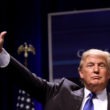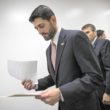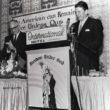In 1976, Gerald Ford and Jimmy Carter squared off for the first presidential debate since Nixon and Kennedy high-mindedly locked horns. The campaign, to that point, had bogged down in childishness. Carter gave an interview to Playboy in which he affirmed that he had “committed adultery in my heart many times.” Thereupon, he was greeted at every stop on the campaign trail with signs like JIMMY CARTER FOR PLAYMATE OF THE YEAR and SMILE IF YOU’RE HORNY. Ford’s agriculture secretary told a dirty joke about black people, and that consumed half a dozen news cycles. Then, on September 23, all those voters pining for something high-minded amid the morass settled down for a serious discussion of the issues.
What ensued was a drag: two men drilled within an inch of their lives not to say the wrong thing—then as now the conventional wisdom was that you could only lose a debate by saying a single “wrong” thing—recited rote answers to banal questions. Media guru Marshall McLuhan, called it “lousy television,” and suggested breaking the next debate into short segments to accommodate the medium and the modern attention span.
Except that something extraordinary happened.
Elizabeth Drew of The New Yorker, in a beige knit turtleneck and a Dorothy Hamill hairdo, asked the evening’s final question, about the House and Senate investigations that in 1975 had revealed the Central Intelligence Agency, National Security Agency, and Federal Bureau of Investigation as nests of lawlessness and fecklessness—finally, something interesting. “Well,” Carter began, his Southern accent taking on intensity, “one of the very serious things that has happened in our government in recent years, and has continued up until now, is a breakdown in the trust among our people in the”—
Then a sudden silence. His lips were moving. But no sound was coming out.
After another couple of seconds, a harsh electronic buzz began, and continued for another quarter of a minute. For 27 minutes, about the length of a TV sitcom, the candidates stood stock-still, Carter folding his hands at the center of his podium, Ford anxiously gripping the edges of his. Finally, reporter Douglas Kiker pronounced, with a hint of triumph in his voice, “And now back to David.” David Brinkley, NBC’s stentorian anchor, turned offstage, apparently not realizing he was on the air. “I gather the debate is over, is that right?” Then, to the camera: “So the debate is over. That’s it.”
It wasn’t, the glitch was fixed, and the candidates went on to give their closing statements as if nothing had happened.
In his memoir, F. Clifton White, the brilliant organizer who’d wired the 1964 Republican nomination for Barry Goldwater, marveled at these “two men who were seeking to hold the most powerful office in the world speechless at their podiums like dummies, afraid to open their mouths and take charge. Neither one of them understood the power of the presidency. If you’re the most powerful man on earth, you’re supposed to act the part, not stand by helplessly while technicians fiddled with the electrical system.” The test was about being presidential. And, the conventional wisdom was right: Carter and Ford both lost.
All credit to Hillary Rodham Clinton. Besieged by that barrage of bullshit, she let him dig his own grave.
Which raises the most important question about last night’s televised spectacle.
Is Donald Trump sniffing cocaine?
You heard it, right?
“We probably disagree a little bit,” he said, “as to numbers and amounts.”
Then, suddenly. Sniff. Sniff.
“But we have to stop our jobs being stolen from us. . . . We have to stop our companies from leaving the United States.”
Sniff.
“They’re doing things that, frankly, we don’t do.”
Sniff.
“It’s a defective agreement, it’s been defective for a long time, many years.”
Sniff.
“In all fairness to Secretary Clinton—, yes is that okay? Good, I want you to be very happy.”
Sniff.
“And why hasn’t she made the agreements better?”
Sniff.
Lester Holt: “Let me interrupt.”
Sniff.
All credit to Hillary Rodham Clinton. Besieged by that barrage of bullshit, she let him dig his own grave. Cool through and through—no better than when he reached his peak of frenzy, in an “answer” that ranged over the deficiencies of NATO, then the Iran deal, his maturity on the question of nuclear war, and his diehard opposition, from first to last, to the Iraq War, including his plea for people to give a ring to Fox News’s Sean Hannity if they didn’t believe how sincerely he had opposed the Iraq War . . . He and Hannity had debated endlessly, he kept insisting, Hannity pro, Trump con. “Sean Hannity . . . he’s willing to say it, but no one wants to call him.” (Obviously a set-up. Sean Hannity, based on his performance over the past month, would clearly pull his pants down and squat in public if Donald Trump so desired.) That was followed by, “I also have a much better temperament than she has, you know?”
Clinton: “Whew! Okay!” Then came the most memorable moment, and as so often in these televised performances it was nonverbal. She let a second or three of air go by, wiggled her shoulders a bit as if shaking off a mosquito, and smiled sweetly—then thoroughly answered each Trump point in seriatim: a grand slam.
She’s supposed to be wooden. I don’t see it. She’s supposed to be hyper-programmed. I don’t see it. Sure, she had her scripted moments. They were sublime, playing her twitchy opponent like a Stradivarius. That moment when she ran down a list of his Greatest Hits of over-the-top sexism, including calling a Miss Universe winner from Venezuela “Miss Piggy” and “Miss Housekeeping,” and reduced him to a splutter: “Where did you find this? Where did you find this?” (Do your homework, Trump campaign: she’s been telling the story publicly since May.) That was when he had his final short-circuit (sniff, sniff), excoriating his opponent for running mean (how dare she!) TV commercials.
In politics, they say when you’re explaining, you’re losing. Trump did a lot of explaining, and a lot of losing. The berserkitudes were epic, the kind of things that make memes that will last long enough for historians to notice. Like: “No wonder you’ve been fighting ISIS your entire adult life.” I hope that becomes as famous as the bead of sweat on Richard Nixon’s chin.
The wickedness was epic, too. Like the time when, asked if he would accept the outcome of the election, Trump chose to demur: “People are pouring into our country. The other day, we were deporting 800 people. And perhaps they passed the wrong button, they pressed the wrong button, or perhaps worse than that, it was corruption, but these people that we were going to deport for good reason ended up becoming citizens. Ended up becoming citizens. And it was 800. And now it turns out it might be 1,800, and they don’t even know.”
“Under President Obama we’ve lost control of things that we used to have control over,” Donald Trump said. Like, for instance, yourself. Hillary, I hope, has turned a corner. And Donald? Marshall McLuhan, after that surreal 1976 debate, said the part where no one was talking was the best part of the show. Forty years later, the parts where Secretary Clinton wasn’t talking were the best part of the show, too. She showed a presidential self-mastery that will serve her well, God willing, in the eight years to come. I think the electorate might have noticed. Here’s hoping, at least.
Rick Perlstein is The Washington Spectator’s national correspondent. His books include Barry Goldwater and the Unmaking of the American Consensus and Nixonland: The Rise of a President and the Fracturing of America.







0 Comments